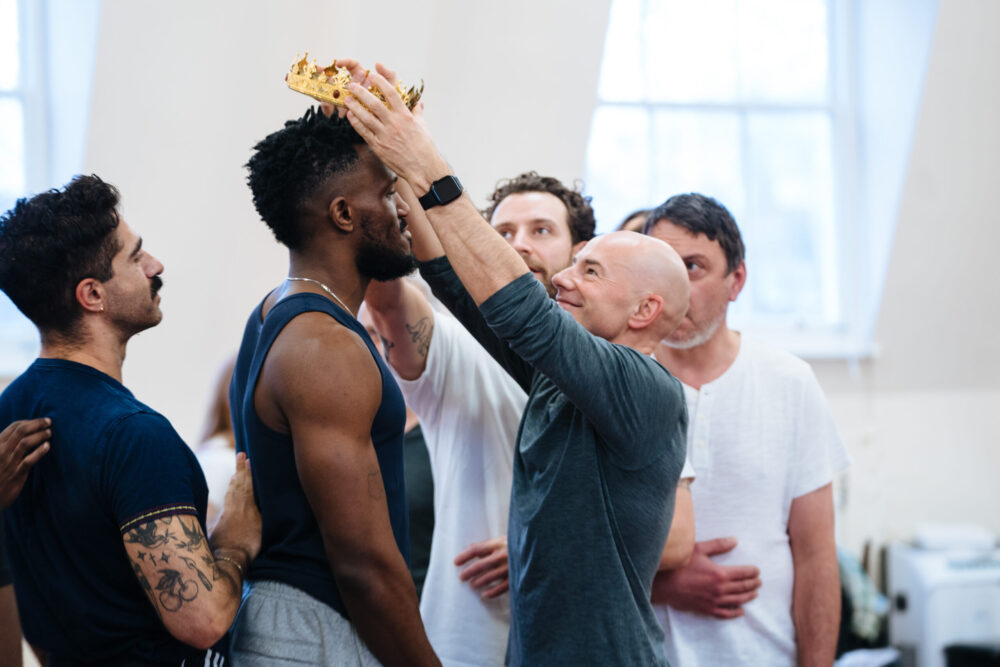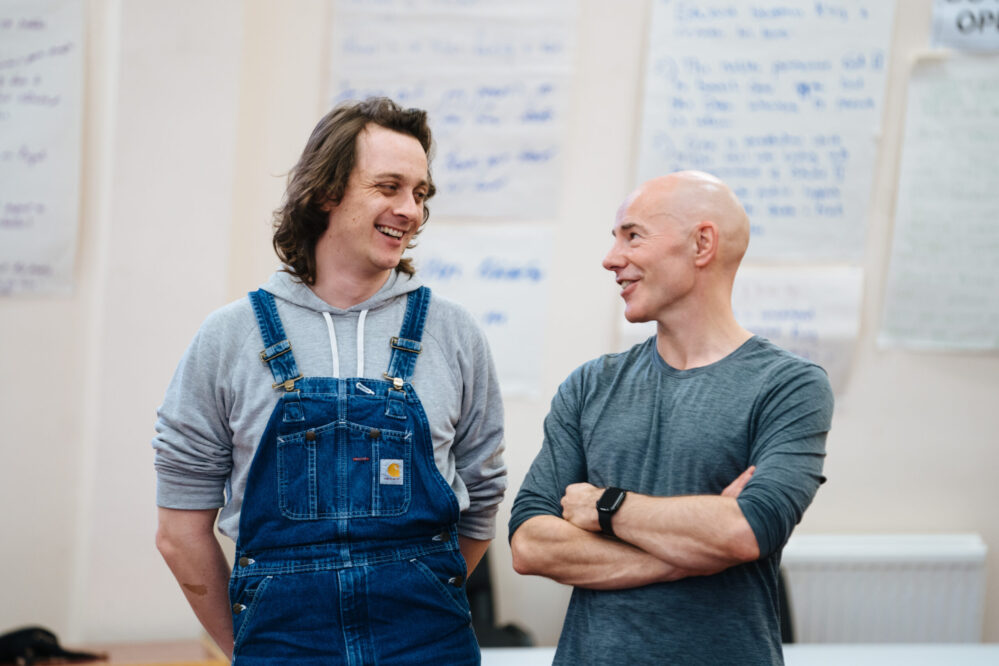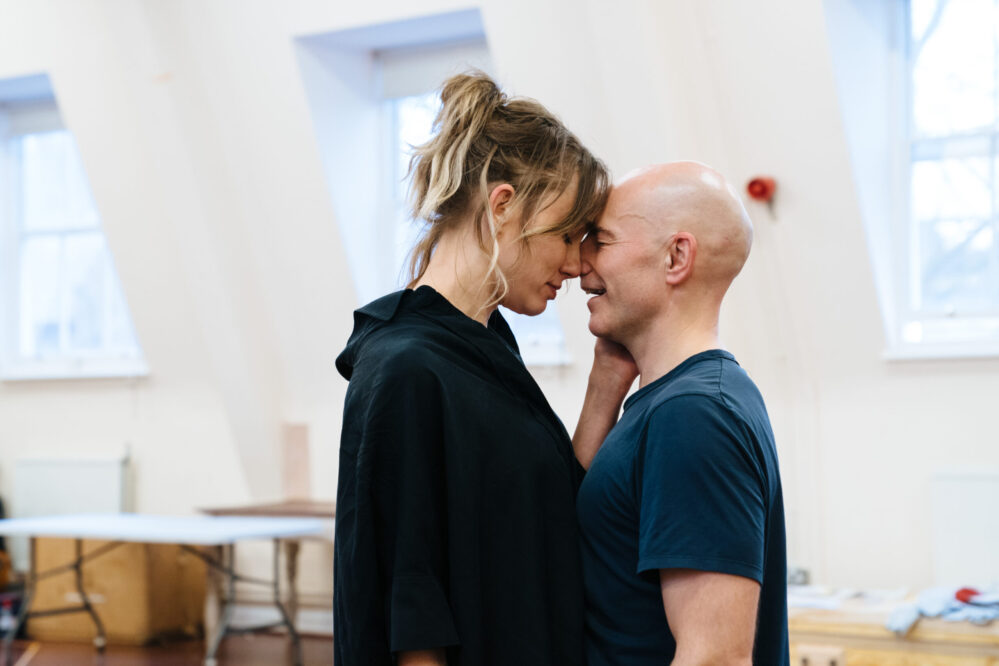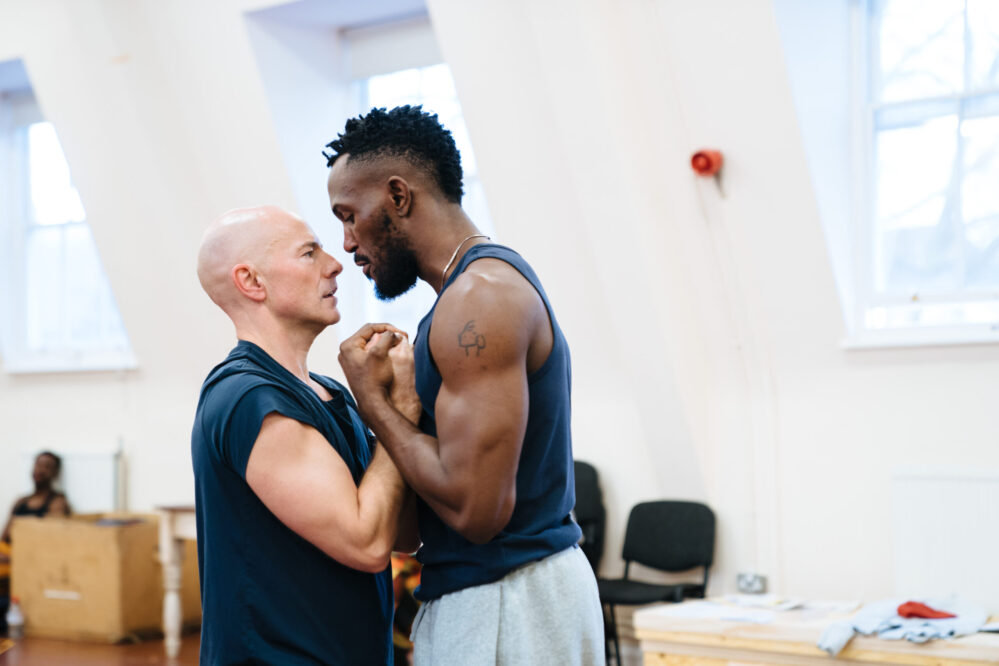The Arts Interview: Daniel Evans

Jon Gower
As he steps onto the stage in Straford-upon-Avon for the first time since he became the Royal Shakespeare Company’s joint artistic director Rhondda-born Daniel Evans is palpably excited.
Taking on the lead role in Christopher Marlowe’s Edward II is both a challenge and a privilege for the Welsh actor who freely admits to still pinching himself when he comes into work.
The RSC has been close to his heart for three decades: ‘I spent my 21st birthday here, and my 30th birthday here, and then my 50th birthday.
When I was a teenager, when I was a student, I would come and see a whole season of work and so many of the actors that I came to love and admire were on stage here.’
Tradition
Evans is also very much aware of the tradition which has pretty much seeped into the brickwork of the Swan Theatre and The Other Place on the banks of the Avon.
‘On this site theatre has been made for 150 years. So when that local brewer decided that there should be a theatre here, which was in 1879, the town didn’t want it.
They said, we’ll just put up a statue to Shakespeare. But he went to America and he got the money. So there’s something about being part of a tradition and a continuum, but also the opportunity that this could also be a place where there’s a good, an interesting collision between history and the contemporary world.’
When Evans took the job of artistic director at the RSC, which he shares with Tamara Harvey, who came over from Theatr Clwyd, they both knew there’d be those who would just want wall-to-wall Shakespeare and for the company to continue to interrogate the Shakespeare canon.
They made a joint decision to both honour the past but also dream of what’s going on now, as Evans explains.
‘When Tamara and I decided that we were going to apply together, we did quite a bit of research. We found this amazing pamphlet that Peter Brook and Peter Hall had written, I think two years into their tenure, which was in ‘61.
Their big decision was to put living playwrights’ work alongside that of William Shakespeare and his contemporaries, so that those plays could be in a kind of dialogue with one another, and they could, sometimes be in a kind of radical contention against one another, in very creative tension.
When I was a student, I remember seeing Anthony Sheer in plays by Peter Flannery, or I’d read plays by Doug Lucie that Brian Cox had been in.
It felt important to us that if we are to be resonant, which the theatre has to be – because it has to hold up the mirror to nature – then we have to make sure that Shakespeare is only part of our work and that contemporary writers have to somehow sit side by side with him.’
Brawler, heretic and possibly a spy, Christopher Marlowe was one of those contemporaries, a direct competitor of Shakespeare. Edward II is considered one of his finest works: as the RSC posters sum it up:
‘The King is dead, long live the King. And his boyfriend. When Edward II insists on ruling with the man he loves by his side, the Palace refuses. The establishment conspires to restore the natural order, plunging the country into a civil war and threatening the very existence of the monarchy. Better a dead king than a gay king.’

Pressure
One imagines there’s a bit of extra pressure when you’re running a company and then join the actors on stage.
Evans agrees: ‘Yes, I’ve done it a few times before. So when I was at the Crucible in Sheffield, I did it twice. I was in a play called The Pride and also then in Stephen Sondheim’s Company.
And yes, it is a strange phenomenon leading a staff body and leading an institution.
‘In Edward II for example, you know, it’s a rather gruesome, brutal death. I don’t know how the director Daniel Raggett’s going to do it yet, but you know he died in a very famous way.
A hot poker was shoved up his backside. Apparently that was in order to preserve his outside, so to kill him from the inside, so his insides would burn, but his outside would be preserved, which is even more brutal.
But that would be an interesting moment going into, you know, staff meetings the next day, you know. I don’t know what that’s gonna be like yet, but pressure, I suppose Tamara and I have both felt pressure.
You know, Tamara just made her debut at the RSC with her first production here as artistic director. And so I imagine she felt a huge amount of pressure and was very relieved that it has gone so beautifully.
I’m actually trying just to focus on the excitement of getting to be an actor again, because I haven’t been in a play for 12 years. So I’m looking forward to just actually exercising that part of me, which has been a big part of my life, but somehow or other being an artistic director or a director has taken over.’
Heroes
Everyone has their favourite RSC production, those touchstones events, when people who knew that theatre has its own magic realised it had even more. Evans has had his fair share of them: ‘Oh wow, yeah, quite a few of them actually.
I remember seeing Des Barrett, a great Welsh actor, play the twins, Antipholus of Syracuse and Antipholus of Ephesus in The Comedy of Errors. And I honestly, I must have been seventeen or something – just never ever thought that Shakespeare would be so funny.
It was just a revelation. But I also remember seeing Ian McKellen, you know, as Richard III in the Cardiff New Theatre. And in fact, I wrote to him and asked him, would he come to our school? And he did.
‘So that was transformative because of Ian’s facility with the verse: you feel like he’s just talking, which is what I like. Gosh, I remember seeing A Midsummer Night’s Dream here for the first time, which was actually the play that was part of my first season here, which I got to be in – Richard McCabe as Puck playing as a naughty schoolboy, literally in blazer, tie and shorts.
So I suppose there are so many performances from that time in particular… Simon Russell Beale as Edward II. I saw it twice.’
Evans appeared with Simon Russell Beale in The BBC Proms when they celebrated Stephen Sondheim’s 80th birthday: ‘And actually he was here recently because he’s just published a book. And, you know, we did a musical together, Bernstein’s Candide.
It’s a privilege, really, of the job, getting to work with people that really were your heroes.’

Being in Straford gives Evans a long view on Wales, a country that very definitely helped nurture his confidence as a performer: ‘The first thing would have been chapel. And because my auntie Doris used to take us to Sunday school and I genuinely at the time loved reading those Bible stories and getting up and learning chapter and verse and getting up to declaim them.’
The chapel in question was Bethel, a Welsh Baptist chapel in Parc in the Rhondda where Evans first realized the power of getting up in front of people and telling stories. ‘And my grandmother then used to take me to the Park and Dare theatre in Treorchy to see plays by Frank Vickery.
It was often adult humor, which would go over my head, but there was that thing that happens, the communion that happens between an actor and an audience and really understanding that deeply, because a woman would see a woman on stage and recognize her as the woman who’d been in the hairdresser’s the day before. Or herself.’
Evans agrees that in Frank Vickery Wales found its Alan Ayckbourne. ‘I got to be in one of his plays later, and, you know, he was a real craftsman and kind of prodigious because he was an actor as well and did a lot of work with the amateur groups.
The Rhondda was full of amateur groups at that time and still is. But somehow or other, it was this instinctive talent that he had that probably came out of this oral tradition and community, of which the Eisteddfod is a big part. And that came later for me.’
Metropolitan sanction
I suggest there is a sense in Wales that people have to go elsewhere to win their spurs, to earn the metropolitan sanction which comes from working away. Daniel Evans’ career has seen him win two Olivier awards, work on Broadway and run theatres in Sheffield and Chichester.
Yet he has worked very little in his native country: ‘Well, there is that saying, isn’t there – this isn’t a reference to myself – that a prophet isn’t a prophet in his own land.
I think in Wales you’ve got to keep your feet on the ground, which I think is a really great characteristic. But sometimes that means pulling people down a peg or two, or rather not allowing them or creating the conditions where their talent can flourish.’
He now works in the heart of England and in one of the powerhouses of English culture. Evans sees the Royal Shakespeare Company as a company for much more than just England.
‘It’s for the UK and it’s for the world because 50% of the world’s children come into contact with Shakespeare in their childhood.
So I just had the privilege of going to Saudi Arabia which is fascinating; every child in Saudi Arabia learns Shakespeare in Arabic. So there’s something about this playwright that crosses cultures, that crosses borders, that is able to speak in many languages.
You speak to Russian actors and they say it sounds better than in English…and we’ll never know. Well, unless you speak both, of course.
‘But I think, you know, there are some Welsh translations that are exquisite. The T. Gwynn Jones translation of Hamlet for example is really masterful I think. There’s one of Hamlet that was done by Michael Bogdanov.
So the Royal Shakespeare Company and the National Theatre are the two national companies that are funded by Arts Council England but we feel a responsibility to the four nations even though we’re only funded by one of them.
There’s a memory that I have of going to see the RSC when they came to Cardiff and that touring, you know, has slowly diminished but we hope to, you know, bring it back. It feels unambitious to only serve one of our four nations.’
Both Daniel Evans and Tamara Harvey had been nervous because they weren’t Shakespeare scholars coming to the RSC, even though they both knew their way around the plays.
Evans suggests: ‘That was in the context of comparing ourselves to our immediate predecessor, Greg Doran. And the funny thing is, Greg and I have a lot in common because we were both actors, we both worked for the company, we both then became directors, and then artistic directors.
But it’s odd, during his time with the company – and Greg really spent over 30 years with the company, almost full-time – Greg really became a scholar of Shakespeare and has written books. I’m not of that ilk.

My starting place is a passion for the work of this playwright, of what he explores, of how he communicates it, which still blows my mind every day. The language is extraordinary. The economy of it, the beauty of it, the scope of it.’
Marlowe’s language is all of those but he is a very different writer to Shakespeare: ‘It’s interesting working on Marlowe. Marlowe has his own greatness, and it’s epic, but the iambic pentameter is much more regular and therefore flatter in terms of the guidance for the actor.
So I suppose what I’m saying is, I always approach it as an actor as a director, not as an academic.
‘So for example, in Edward II, Marlowe asks the actor to make huge emotional leaps between lines. And you realize that even, you know, they were the same age, they were three months apart, which is incredible, and both kind of, you know, lower class boys.
It’s just that Marlowe went to Cambridge and Shakespeare went to the local grammar school here. Shakespeare’s learned how to guide the actor through the development of emotions. So you never have to do the leap, Shakespeare’s doing it for you. And that’s genius.’
Magic
Sitting with Daniel Evans at a table overlooking the river Avon, in one of the most creative theatre spaces in the land, if not the world, seems like a good place to ask about the special magic of theatre:
‘Well, theatre is obviously the act that takes place when one person is in one space and one person is watching. It’s as simple as that. And that’s all it takes. And it can happen anywhere, but without those two constituents, it can’t happen.
One person’s watching, one person’s doing. Sometimes when that happens, when that transaction happens, one person, the audience member, is changed and changed forever. In the best circumstances, yes.
‘My favourite quote on theatre is from an American poet, Anne Carson. And she says, and she translates the Greeks, “Do you want to go down to the pits of yourself all alone? Not much. What if an actor could do it for you? Isn’t that why they are called actors? They act for you.
You sacrifice them to action. And this sacrifice is a mode of deepest intimacy of you with your own life. Within it you watch yourself act out the present or possible organization of your nature.”
Evans sees acting, as does Anne Carson, as offering a deep understanding of yourself and your own nature. ‘I think there is something about breathing the same air as the actor, being in the same space, and the risk that that actor is taking by doing it live in front of you, that anything can happen at any moment.
And there is something that is alive about that that reminds us about being alive. And I think that’s the understanding that we get from actors. Anne Carson says this, which I just love, which is, “You can be aware of your own awareness of this nature as you never are at the moment of experience. The actor, by reiterating you, sacrifices a moment of his own life in order to give you a story of yours.”
Edward II runs at the Swan Theatre in Stratford-upon-Avon until the 5th April 2025.
Support our Nation today
For the price of a cup of coffee a month you can help us create an independent, not-for-profit, national news service for the people of Wales, by the people of Wales.




